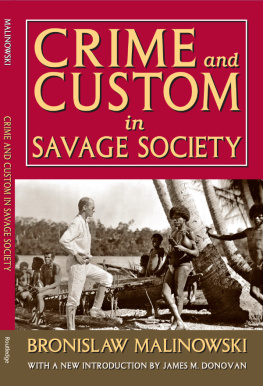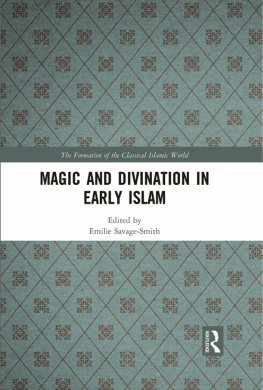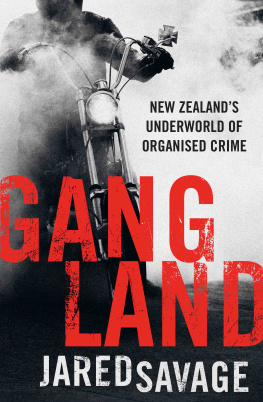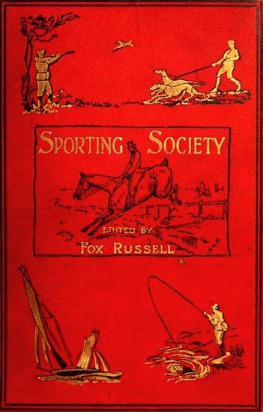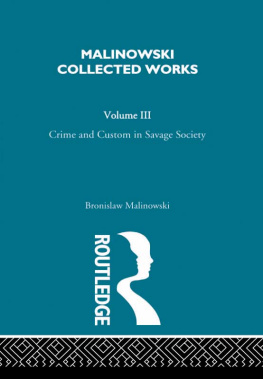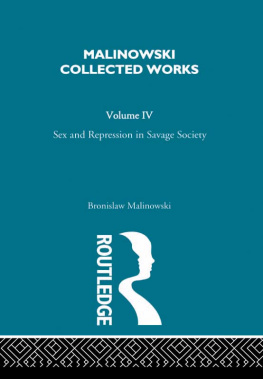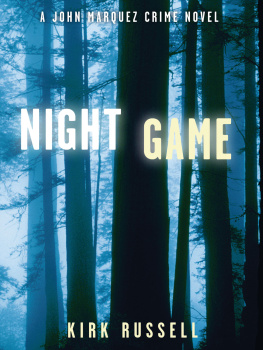CRIME and
CUSTOM
in
SAVAGE SOCIETY
Originally published in 1926 by Harcourt, Brace & Company, Inc.
Published 2013 by Transaction Publishers
Published 2017 by Routledge
2 Park Square, Milton Park, Abingdon, Oxon OX14 4RN
711 Third Avenue, New York, NY 10017, USA
Routledge is an imprint of the Taylor & Francis Group, an informa business
New material this edition copyright 2013 by Taylor & Francis.
All rights reserved. No part of this book may be reprinted or reproduced or utilised in any form or by any electronic, mechanical, or other means, now known or hereafter invented, including photocopying and recording, or in any information storage or retrieval system, without permission in writing from the publishers.
Notice:
Product or corporate names may be trademarks or registered trademarks, and are used only for identification and explanation without intent to infringe.
Library of Congress Catalog Number: 2012019605
Library of Congress Catalog-in-Publication Data
Malinowski, Bronislaw, 1884-1942.
Crime and custom in savage society / Bronislaw Malinowski; with a new introduction by James M. Donovan.
p. cm.
Originally published: New York: Harcourt, Brace & Co., 1926.
ISBN 978-1-4128-4978-4
1. Social control. 2. Law, Primitive. 3. Primitive societies. 4. Ethnology-Melanesia. I. Title.
GN493.M3 2013
303.3'7-dc23
2012019605
ISBN 13: 978-1-4128-4978-4 (pbk)
Dedication
To
sir richard gregory, d.s c.
Editor of Nature
List of Illustrations
1Fishing Canoes on the Lagoon
2Bundles of Fish Taken over from the Fishermen by the Island Natives
3A Ceremonial Act of the Kula before the Chiefs Personal Hut at Omarakana. The Ethnographers Tent in the Background
4Ceremonial Offering of Yams, Carried in Specially Made Wooden Measures
5Obligatory Display of Grief in Ritual Wailing
6A Conical Heap of Yams Is Put in Front of a Chiefs Storehouse by His Wifes Relatives
The modern anthropological explorer, who goes into the field fully trained in theory, charged with problems, interests, and maybe preconceptions, is neither able nor well-advised to keep his observations within the limits of concrete facts and detailed data. He is bound to receive illumination on matters of principle, to solve some of his fundamental difficulties, to settle many moot points as regards general perspective. He is bound, for example, to arrive at some conclusions as to whether the primitive mind differs from our own or is essentially similar; whether the savage lives constantly in a world of supernatural powers and perils, or on the contrary, has his lucid intervals as often as any one of us; whether clan-solidarity is such an overwhelming and universal force, or whether the heathen can be as self-seeking and self-interested as any Christian.
In the writing up of his results the modern anthropologist is naturally tempted to add his wider, somewhat diffused and intangible experiences to his descriptions of definite fact; to present the details of custom, belief, and organization against the background of a general theory of primitive culture. This little book is the outcome of a field workers yielding to such temptation. In extenuation of this lapseif lapse it beI should like to urge the great need for more theory in anthropological jurisprudence, especially theory born from actual contact with savages. I should also point out that in this work reflections and generalizations stand out clearly from the descriptive paragraphs. Last, not least, I should like to claim that my theory is not made of conjecture or hypothetical reconstruction but is simply an attempt at formulating the problem, at introducing precise concepts and clear definitions into the subject.
The circumstances under which this thesis came into being have also contributed towards its present form. The material was first prepared and the conclusions framed in response to an invitation from the Royal Institution of Great Britain, before which a paper was read (on the Forces of Law and Order in a Primitive Community) on Friday evening, 13th February, 1925. As often happens, I found myself with more material on my hands and many more conclusions framed than could be included in an hours address. Some of these I have had the privilege of publishing in Nature (see Supplement, 6th February, 1926, and article, 15th August, 1925). The full version is contained in this little book.
I wish to express my thanks to the Council of the Royal Institution for the kind loan of blocks and the permission to reproduce them. To Sir Richard Gregory, the Editor of Nature, I am indebted for allowing me to reprint the articles mentioned. I owe him much, moreover, for the help and encouragement I received from him in my earlier work.
In the preparation of this volume I received competent assistance from Mr. Raymond Firth, who is carrying on research work at the London School of Economics in the Department of Ethnology. I was able to secure his help through a grant from the Laura Spelman Rockefeller Memorial. The Board of this institution has of late devoted some special attention to the furtherance of anthropology, as a part of its interest in the development of the social sciences.
The study of the rapidly vanishing savage races is one of those duties of civilizationnow actively engaged in the destruction of primitive lifewhich so far has been lamentably neglected. The task is not only of high scientific and cultural importance, but also not devoid of considerable practical value, in that it can help the white man to govern, exploit, and improve the native with less pernicious results to the latter.
The Laura Spelman Rockefeller Memorial, through its enlightened interest in anthropology as a branch of the social studies, will earn a deep gratitude from present and future humanists in erecting a lasting monument to the noble woman in whose memory it has been founded.
B. M.
New York City
March, 1926
0
Introduction to the Transaction Edition
Crime and Custom in Savage Society represents Bronislaw Malinowskis major discussion of the relationship between law and society. To better appreciate the significance of the book, we must first place it in the context of his wider anthropological corpus. Throughout his career Malinowski endeavored to construct a coherent science of anthropology, one modeled on the highest standards of practice and theory. Methodology steps forward as a core element of the refashioned anthropology, one that stipulates the manner in which anthropological data should be acquired.
Scholars such as W. H. R. Rivers (1913) had earlier preached the view that scientifically meaningful ethnographic data would best be obtained through trained workers deeply involved in the mundane routines of ordinary livingthe participant observation influentially described in Malinowskis introduction to Argonauts of the Western Pacific (1922). Malinowski was the first, however, to turn this ideal into a practical anthropological method, one formalized in theory and then, more importantly, implemented in the field. His extended immersion in the daily lives of the studied group, mastering the native language to record theoretically informed data, modeled a constellation of attributes that would transform the discipline. Perhaps his conscientious attention to method, both in execution and justification, derived from his prior training as a physicist and mathematician; we see the same cluster of influences behind the founder of American anthropology, Franz Boas.

